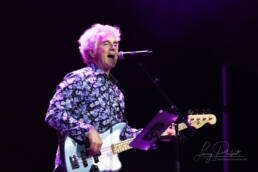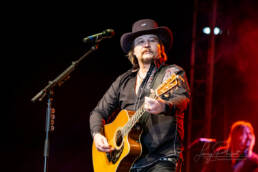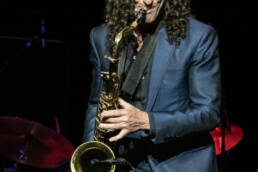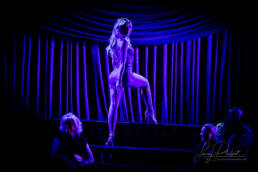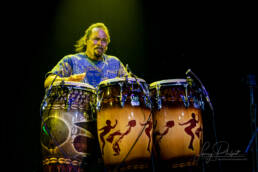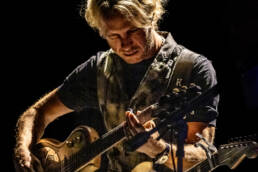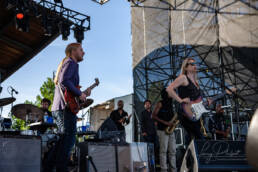Trombone Shorty: The Horn That Woke New Orleans
Note: About 2010, I met Troy at a little concert bar in Indianapolis one night, (The Vogue) when the radio station I was working for tried to stiff him for his fee, telling him they’d have to cut him because of time. He asked them what they could pay, because he still wanted to perform. They offered $50. and he took it. I sat with him in the booth and bought him and his girlfriend drinks because he got such a shitty deal. Now, he rules New Orleans. Now, he can buy that radio station. I call that poetic justice.

The Beat That Grabbed Him
Step into Treme, New Orleans, late 1980s, where a four-year-old Troy Andrews toddles down the street, clutching a trombone twice his size. It’s a second-line parade—brass blaring, feet stomping—and little Troy’s eyes are wide, his grin wider. His brother James, a trumpet ace, hands him that horn, a battered hand-me-down, and says, “Blow, kid.” Troy does, a squeaky blast that makes the crowd laugh and cheer. Music’s in his blood—his grandpa was a jazzman, his mom a singer—but that day, it’s his. He’s not dreaming of stages; he’s living the rhythm of the city, a pint-sized prodigy who’ll earn the name Trombone Shorty from necessity and destiny.
The Kid from Treme: A Biography
Born January 2, 1986, in New Orleans, Troy Michael Andrews grew up in Treme, the cradle of jazz. His mom, Lois, sang in church; his dad, James Sr., played street gigs. The Andrews clan was a dynasty—brother James Jr. a trumpet legend, cousins on every corner with horns or drums. Poverty pinched, but music fed them. By six, Troy led his own band, stunning Preservation Hall vets. School? He went, but the streets taught more—brass, funk, soul seeping into his bones.
Life’s been a groove with bumps. Troy’s single, soaking up family love instead—siblings and cousins his backbone. Since 2017, he’s been with Brittany Reese, keeping it low-key. At 39, he’s a wiry maestro, still rooted in NOLA, a horn always close.
The Career That Blew Up
Troy’s no sideman—he’s Trombone Shorty & Orleans Avenue, formed in 2005 with Pete Murano (guitar), Mike Ballard (bass), Joey Peebles (drums), and a rotating brass crew like Dwayne Williams and Dan Oestreicher. His 2010 debut, Backatown, fused jazz, funk, and rock—“Hurricane Season” a gritty calling card. Say That to Say This (2013) and Parking Lot Symphony (2017) cemented him, blending Treme roots with modern punch.
Kid gigs shaped him—The Andrews Brothers with James in the ’90s, then Lenny Kravitz’s horn section at 19 (2005 tour). He’s popped with Rebirth Brass Band and jammed with Galactic. Solo, For True (2011) hit No. 1 on Billboard’s Jazz chart. TV? He’s a Treme regular (2010-13, as himself), rocked The Late Show, and voiced a Muppet Babies trombonist. Film includes The Peanuts Movie (2015, soundtrack). Pals like Cyril Neville and Galactic’s Stanton Moore tie him to NOLA’s pulse; a 2012 White House gig with Foo Fighters’ Dave Grohl made news.
Awards? Two Grammys—2012’s Best Pop Instrumental (For True), 2020’s Best Contemporary Instrumental (Tallinn)—plus a 2016 OffBeat Hall of Fame nod. He’s a jazz king with crossover cred.
The Hits That Define Him
- “Hurricane Season” (2010) – Troy wrote this brassy banger, a Backatown standout, uncharted but iconic.
- “Do to Me” (2011) – Co-written with Al “Carnival Time” Johnson, this funky For True cut hit No. 4 on Jazz charts.
- “Laveau Dirge No. 1” (2017) – Troy’s haunting Parking Lot Symphony opener, a NOLA elegy.
- “Something Beautiful” (2013) – With Lenny Kravitz, this Say That to Say This gem grooves hard.
Controversy in the Brass
Troy’s kept it clean, mostly. In 2018, he caught heat for a Coachella set with Migos—purists cried “sellout” over the rap-jazz mashup, but he clapped back, “Music don’t got rules.” Post-Katrina, his 2006 comments on slow rebuilding—“FEMA forgot us”—ruffled official feathers, though fans cheered his truth. He’s less rebel, more bridge-builder, dodging tabloid traps with NOLA charm.
A Night of Second-Line Soul
Let’s hit June 15, 2013, at Tipitina’s in New Orleans. Trombone Shorty’s fresh off Say That to Say This, 1,200 fans sardined in. He’s mid-“Do to Me,” horn blazing, when a power cut kills the lights—silence, groans. Troy, unfazed, hops offstage with his trombone, leads the band into the crowd, and kicks off an acoustic “When the Saints Go Marching In.” Fans join, clapping, singing; it’s a second-line reborn. Power’s back for “Hurricane Season,” and the roof nearly lifts. “That’s Treme right there,” he laughs later, dripping sweat. It’s the night Trombone Shorty turned a blackout into a block party—pure NOLA magic.
